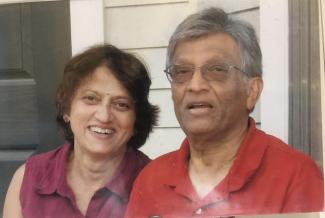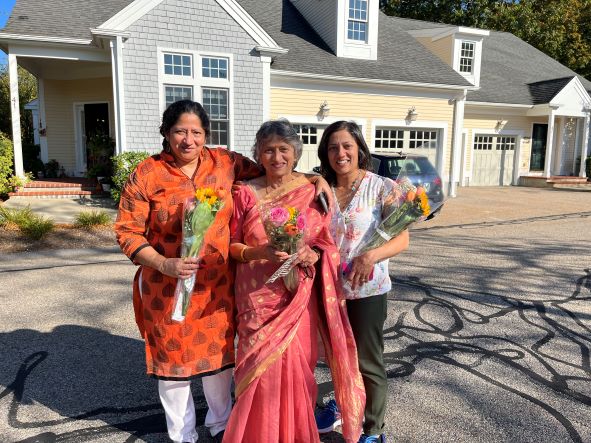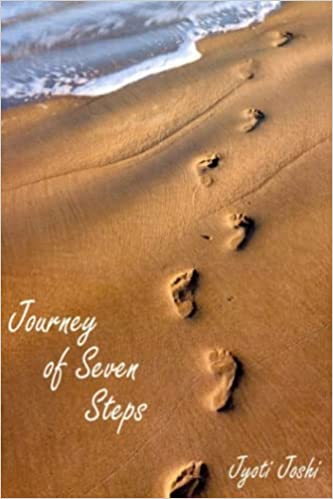
Jyoti Joshi in her book ‘Journey of Seven Steps’ chronicles her happy marriage and migration to America and writes about poignant moments as a dedicated caregiver to her husband when he was diagnosed with Alzheimer’s disease. She shares her experience as a caregiver and her reasons for writing the book.
Your book ‘Journey of Seven Steps’ is an emotional account of 50 years of your life. What motivated to write down your memoirs?
I have been in the habit of writing and maintaining a personal diary since a young age. It was my escape. I believe in writing my emotions as they swing up and down. When I was going through my husband’s illness, I used to pour my heart out to my diary. I could read it later with Sakshi Bhava or as a witness. One day when I was writing, I started thinking, ‘What if I begin to forget. Alzheimer’s struck my husband; it can happen to me also.’ That hit me like lightening. And that’s when I started writing more, noting down even minor details. After my husband passed away, a friend and her husband visited me. I told him that I was thinking of writing a book. I read a bit of my writing to him, and he just started crying. He was so deeply moved. After that I knew I had to share my journey with others.
हिंदी में पढ़ें: उनको अल्जाइमर होने के बाद, मैंने पत्नी नहीं, माँ बनकर उनकी देखभाल की
Could you explain the title of the book?
The book is about my life with Madhukar, my husband. During our marriage we took the religious seven vows symbolised by saptapadi - the seven steps together. That is when our journey began. And those seven steps turned into millions and millions of steps for us. I though the title was most apt.
Could you give us a little background about your husband and when was he diagnosed?
Madhukar was a quiet person. It would take him some time to warm up to people. In contrast I was talkative. He used to tease me that ‘Jyoti can chat with anybody. She can chat even with the birds in our yard.’ Although he would appear to be reserved, in reality he was extremely friendly. He was very smart and intelligent. He was a gold medallist from the Bombay University and an accomplished statistician. He was teaching at Jamnalal Bajaj Institute before he left for the USA. He loved life. He loved challenges: it could be in his career, or climbing a mountain, or skating in the ice rink.
Regarding his Alzheimer’s symptoms, I started noticing something amiss when he was 70 years old in the year 2008. But I did not give it much importance, as we used to call him an ‘absent minded professor’. I became aware when his driving started getting affected. He had always been an excellent driver with a very clean record. I could see the changes in his driving: not stopping at the stop sign, could not find the right exit when we were on highway, etc. I was frightened about his and other’s safety. I didn’t want him to drive anymore. Also, I noticed he was having trouble remembering things here and there. He would forget where he had kept the cheque book, or the keys. It was not normal. Something was not right. But I still never thought it was Alzheimer’s. I had heard about it on TV. But it was not commonly recognised. You think about it as an old person’s illness. Madhukar was not old. He looked very young physically also. Finally, I took him to the doctor in 2009, that’s when he was medically diagnosed with Alzheimer’s.
What were the initial difficulties in accepting and adjusting to the diagnosis?
I accepted his illness immediately as our Karma. I never questioned, ‘Why me or Why him?’ The difficult part was to understand the disease and how it’s going to affect him. I didn’t know how I was going to deal with it. The doctor was there only to diagnose him and prescribe the medicine for him.
Related Reading: What Caregivers of Persons with Dementia For Effective Care
So, what I did was I read a lot about Alzheimer’s. I found that there were support groups. I joined them initially, but the experience was quite distressful. I didn’t want to hear the horrible experience of others because it was scary. At that time in the early days, Madhukar was still working and functioning, I didn’t want to hear the depressive stories of Alzheimer’s at an advanced stage. I stopped going initially, but later I joined again.
When Madhukar was diagnosed it was already at Stage 3 Alzheimer’s. He was already half-way, more than half-way into the disease. It was difficult to understand the disease. And I was not aware what was it going to do. What does it entail? My reading helped me tremendously. As the illness progressed, our relationship changed. I became his mother, and he became my baby. I was going to take care of him. I realised he had started to lose his memory and emotions. And that was hard for me to understand because he didn’t look sick. That was the difficult part.
What was your biggest challenge in the journey?
How could I take care of him physically. At the beginning I didn’t have to do anything, but as Alzheimer’s progressed, he became more and more physically dependent. I was 62 at that time and suffered a slipped disc. So, I hired a help. My daughters were the greatest support. They would force me out of the house. Mummy, ‘Time up, you need to go out’. I would fight with them. I would protest and say ‘I don’t need that break. I am fine’. But just to be away from my Madhukar was difficult. It was the biggest challenge to separate myself from him because I loved him dearly. We had a wonderful, loving relationship all our life. As I became a caregiver, I made sure not to cry in front of him. I didn’t want him to see me upset or helpless. So, I would go the bathroom and cry. To take care of him, I had to become strong.

What coping strategies would you recommend as a caregiver especially for Alzheimer’s?
I can’t’ really give any advice without talking to a caregiver. Each patient is different and how the disease affects him is different; I only want to share my experience to let them know they are not alone to feel lonely or desperate or depressed. To shed some light on caregiving. Here are some things I changed in my caregiving.
- First of all, and most importantly, you have to be loving caregiver. There will be many occasions when you get angry, but you have to always remind yourself that this is not the same person you knew. That person has gone. This is the illness. So always be loving. When Madhukar became ill, he used to shout at me. That would make me fall apart. I too would want to get angry, defend myself and shout back. But I would stop myself. I had to remind myself that I am not dealing with the same Madhukar I used to know.
- Never argue or try to convince the patient, no matter how wrong he is. Do not try to justify anything. Never ridicule him. Do not make statements like ‘How many times I have tell you this.’ Or ‘how many times I have showed you this’. You, as a caregiver, must remember that his mind is not functioning. Rather keep your hands on his shoulder. Touch, a loving touch. is very important. Just like mother picks up the child when he falls, holds him, and rubs his back, you too have to behave similarly.
You have been teaching yoga and stress management for 23 years. Do you think that helped you be stronger and helped you cope better?
Absolutely. You don’t need yoga for Alzheimer’s. There is a battle every single day out there in your life. Yoga philosophy has taught me how to accept everything calmly. I tell my daughters; you don’t start meditating when there is a fire in your mind. Start meditating now. It is not easy for everybody to meditate, but you can just sit quietly for a few minutes every day. Make it a habit. So, my yoga practice and teaching has definitely helped. So did my parent’s sanskar or grounding.
How were your children impacted with their father getting Alzheimer’s?
My daughters were already grown up when their father was struck with Alzheimer’s. They were both successful in their career and were living on their own. I know they were sad. But they never let it become evident. I never had to ask them for their help, they always came on their own to help me. We are all living near Boston, so it was easy commute for them. I could not have managed without their loving support.
Alzheimer’s is considered a caregiver’s disease? Why is it called that?
Maybe because the disease is such that it affects the caregiver equally. Caregivers can get sick looking after an Alzheimer’s patient. It is more challenging than tending to a bed ridden patient. The stress can manifest itself in many ways. It can get overwhelming physically, emotionally and mentally. So if you are not taking care of yourself, the stress can result in some sickness in the caregiver. I used to feel selfish and guilty, if I would take off some time - for a walk or go for my workshop. I used to think that I should be with him. Even though I was being strong emotionally, sometimes I would feel myself breaking.
Must read: How to prevent caregiver burnout
When should an Alzheimer’s patient be admitted to a nursing home?
That is the hardest thing. There is no definite time or stage. Some people don’t have the physical strength to care for the patient. Nursing homes can be very expensive. Some shift the patient when he loses bladder control, others shift when the person becomes completely dependent, still others opt when the person loses total memory and fails to recognise. I know a few people who kept their loved ones at home, but then they had no time to breathe even. I would strongly suggest that you talk to your family and doctor on the course of action. Your decision will also be affected by your needs, capacity. You are not being selfish by making a choice that suits you. I still cry sometimes about why I sent Madhukar to a nursing home. I still feel guilty about it. Logically I know it was the best decision, but emotionally it was hard to reconcile. His doctor was telling me to move him almost 2 years, before I took the decision. He was 76 when I finally shifted him to the nursing home and he was there for 10 months before he breathed his last.
What advice would you like to give to someone going through similar situation?
Be a loving, strong caregiver. Take care of your emotional and physical self as much as you are taking care of the patient. And find your own happiness. There is a lot of healing in nature so take walks, spend some time outside. Tap the Daivi Shakti, or divine power, that is hidden inside us. Find something that gives you joy. Do not feel guilty if you are going out for a walk or watching a movie. You have to become your own caregiver.
Read the review of Jyoti Joshi's book here: Journey of Seven Steps








